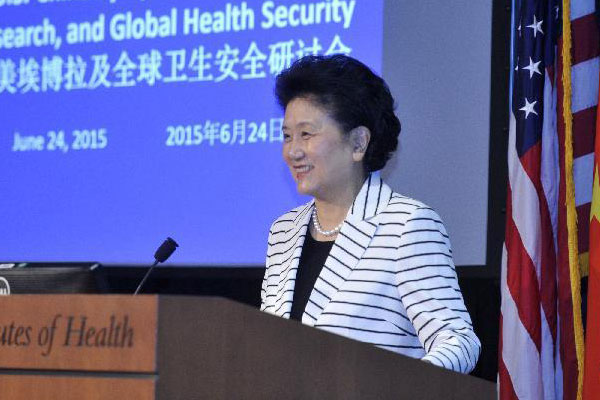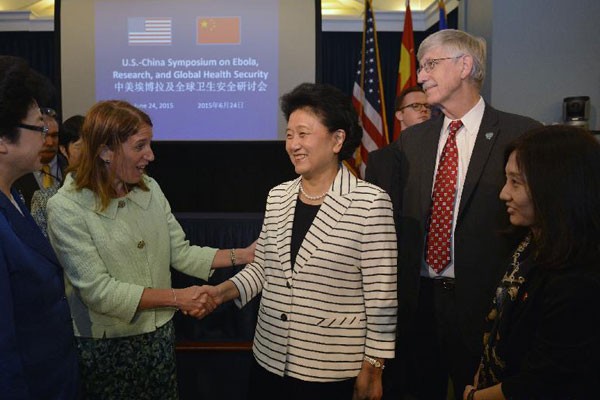
Visiting Vice-Premier Liu Yandong speaks during the US-China Symposium on Ebola Research and Global Health Security in Washington, the United States, June 24.[Photo/Xinhua]

Visiting Vice-Premier Liu Yandong (3rd R, front) shakes hands with Secretary of the US Department of Health and Human Services Sylvia Burwell, during the US-China Symposium on Ebola Research and Global Health Security in Washington, the United States, June 24. [Photo/Xinhua]
WASHINGTON — China takes seriously the prevention and control of emerging infectious diseases and has played an active role in global emergency response to such health threats, visiting Vice-Premier Liu Yandong said in Washington on June 24.
Liu took China’s response to the Ebola outbreak in West Africa as an example, saying that China has provided four rounds of humanitarian aid with a combined value of 750 million renminbi ($120 million), sent more than 1,000 medical staff to the affected countries, treated more than 900 patients, and trained more than 13,000 medical workers for Sierra Leone, Liberia, Guinea and their neighboring countries since the outbreak of the deadly disease.
It’s “the largest-ever foreign medical aid program in the history of new China,” Liu said in a keynote speech in the US National Institutes of Health, where a symposium on Ebola, research and global health security was held as part of the sixth China-US High-Level Consultation on People-to-People Exchange (CPE) in Washington.
“With that, China has become an important force in providing assistance to West Africa in fighting Ebola,” she said.
Liu added that China started to dispatch medical teams to other countries as early as in 1963. Over the past 50 years, China has sent 23,000 medical staff to 66 countries and regions, who have provided services for 270 million people in Asia, Africa, Latin America and Oceania.
On China-US health cooperation, Liu said both countries have greater common interest and shared responsibilities to maintain global public health security and respond timely to emerging infectious diseases.
“Stronger cooperation between China and the US matters not only for the health of both our peoples, but also has global significance,” Liu said.
She said the fact that health agenda was brought into the CPE for the first time will “deepen health cooperation and add new dimensions to people-to-people exchange between China and the United States.”
Liu also gave some recommendations in this regard, such as making the training of professionals a great priority in health cooperation, strengthening joint scientific research in tackling major global public health challenges, promoting mutual learning between traditional and modern medicine, and deepening cooperation between the two countries in multilateral institutions including the World Health Organization.
Before the symposium began, Liu met with Sylvia Burwell, secretary of the US Department of Health and Human Services. Liu and Burwell also attended a signing ceremony of an agreement for the collaborative program on emerging and re-emerging infectious diseases between the two countries’ health agencies.
